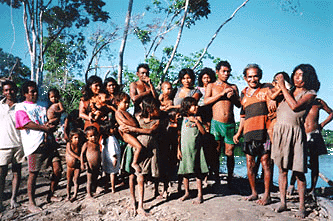(VOVworld) – A new study by the Oslo University reveals that Piraha, the language of a tribe in Brazil’s Amazon rainforest is the most difficult language to learn in the world. Linguists also list other difficult languages: Arabic, Chinese, Korean, Japanese, and Hungarian.
 |
| The Pirahas tribe (Photo: Dan Everett Book) |
Rolf Theil, a linguistics professor at the University of Oslo said Piraha has unique pronunciation, vocabulary and grammar among 2,700 human languages. Communicating in Piraha, we can speak the language, sing it or whistle it. This language is based on low and modulating tones, convenient for communicating along the Maici River in the Amazon jungle of Brazil, the habitat of the Pirahas.
The Pirahas use only 3 vowels and 8 consonants as transcribed phonetically by linguists’ because this language is non-written. But many sounds carry meaning. The tribe does not conjugate their verbs, neither with a future nor a past tense. Every Piraha verb has at least 65,000 forms. Linguists say a foreigner with his average memory needs at least 10 years to be able to communicate basically in Piraha.
Arabic is also difficult because it has very few words and the limited number of vowels makes it almost impossible for learners to pronounce properly. Learners of Japanese and Chinese should remember thousands of characters. Their writing forms which are totally different from the Latin alphabet are also an obstacle. It takes a learner of Arabic, Chinese, Korean, or Japanese at least 2 years to be fluent. Hungarian language has male, female, and natural forms plus 7 verb conjugations.
UNESCO has stressed the need to protect the rare and difficult languages, saying half of human languages are on the verge of extinctions in the next several generations. 96% of world languages are spoken by 4% of world population. The Piraha is used by the Pirahas population of only 350. In 2007, the UN General Assembly issued a resolution on pursuing multilingualism as a means of promoting, protecting and preserving diversity of languages and cultures globally. In her message delivered on International Mother Language Day 2016, UNESCO Director General Irina Bokova said multilingualism is essential for the success of the UN 2030 Agenda for Sustainable Development.